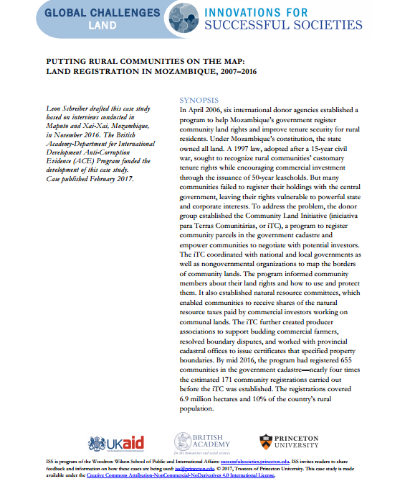Location
Quem somos
De 2006 a Abril de 2009, a iniciativa para Terras Comunitárias (iTC) foi um projecto financiado por um grupo de seis doadores europeus, liderados pelo Departamento Internacional para o Desenvolvimento do Reino Unido (DfID), cobrindo as províncias de Gaza, Manica e Cabo Delgado. Entre 2009 e 2013 a sua área de cobertura expandiu para as províncias de Niassa, Nampula e Zambézia, com o financiamento do Millennium Challenge Corporation dos Estados Unidos. Desde 2013 a iTC cobre todo o país com excepção de Maputo e Inhambane. No período de Maio a Dezembro de 2014, ainda com os mesmos doadores, a iTC está numa fase de transição para se transformar em Fundaçãoiniciativa para Terras Comunitárias (iTC-F).
O principal objectivo da iniciativa é de proteger os direitos das comunidades rurais sobre a terra e promover o uso sustentável de recursos naturais, como contribuição para redução da pobreza e promoção de desenvolvimento económico no país.
A iTC procura elevar a capacidade das organizações comunitárias de base de forma a torná-las actores de desenvolvimento, especialmente a partir do uso e gestão sustentável da terra e outros recursos naturais.
:::::::::::::::::::::::::::::
KPMG has managed the Community Land Initiative (iTC) since its establishment in 2006. iTC focuses on providing financial, technical and planning services to rural communities to secure land and natural resources user rights in stimulating local economic development.
Land is the prime source of livelihood and income for Mozambique’s rural communities. Mozambique’s land and other natural resources have come under great pressure from foreign and domestic private investment in recent years as a result of relatively low population density, good land availability and high potential agricultural productivity. This creates challenges for rural communities and government to use private investments as opportunities for partnership, and sustainable local economic development, and to overcome the risks of conflict that arise when investments are not properly planned.
iTC’s objectives are threefold:
To safeguard the livelihoods of communities and social groups in the target provinces of Niassa, Nampula and Zambézia by assisting communities to secure land tenure and natural resource user rights, thereby protecting against encroachment and displacement of their rights;
To operate pro-actively in communities where the potential for conflict between the community and natural resource users/investors is highest, and
To support and assist local communities and social groups in securing their rights to potentially valuable natural resources that can be used to sustain or tap on local economic opportunities.
Members:
Resources
Displaying 1 - 4 of 4Putting Rural Community on the Map
In April 2006, six international donor agencies established a program to help Mozambique’s government register community land rights and improve tenure security for rural residents. Under Mozambique’s constitution, the state owned all land. A 1997 law, adopted after a 15-year civil war, sought to recognize rural communities’ customary tenure rights while encouraging commercial investment through the issuance of 50-year leaseholds.
Tools to Support Transparency in Land Administration: Trainer's Guide
This trainer's guide is complementary to this training toolkit. It is part of an approach that aims to sensitize government agents about land administration, develop their capacity to address issues of corruption and to enhance transparency in the land sector. It focuses specifically on land administration with a view to filling the capacity development gap in the land administration sector. Training content covers key themes clustered into different training sessions related to land governance, transparency, land administration and tools that could help bring about transparency.
Tools to Support Transparency in Land Administration : Training Toolkit
This training toolkit aims to sensitize government agents about land administration, develop their capacity to address issues of corruption and to enhance transparency in the land sector. It focuses specifically on land administration with a view to filling the capacity development gap in the land administration sector. Training content covers key themes clustered into different training sessions related to land governance, transparency, land administration and tools that could help bring about transparency. It comes with a trainer's guide.




